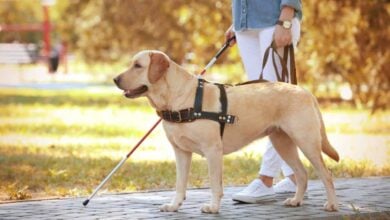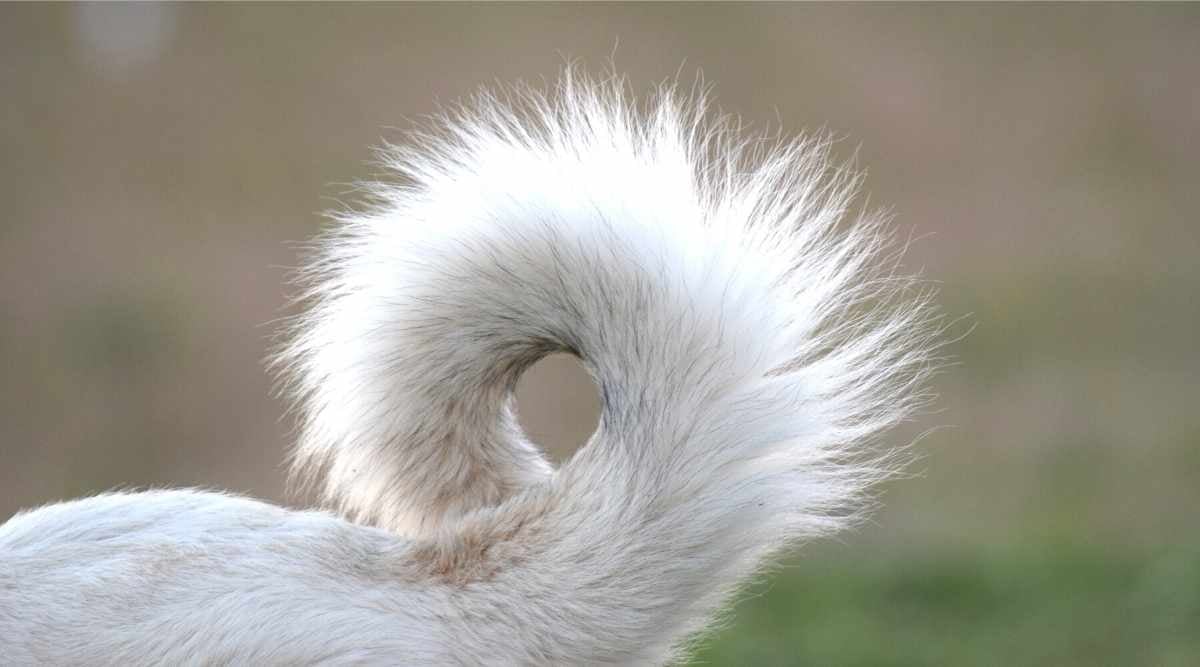Rough Collie Breed Information: Facts, Traits, Pictures & More
When you purchase through links on our site, we may earn a commission. Here’s how it works.
If you’re looking for inspiration for a perfect family dog, the Rough Collie could be just the breed you’re looking for. A member of the herding group, the Rough Collie ranks at number 39 in the American Kennel Club’s 2022 chart of most popular dog breeds.
Table of Contents
The Rough Collie breed first found international fame in the famous 1950s movie, “Lassie Come Home.” The Rough Collie has a long, luxuriant coat and majestic bearing. Another type of Collie is the Smooth Collie, which has a shorter, flatter coat.
In this article, we will focus on the Rough Collie, often called simply the Collie. We take a look at the breed’s history, health, and personality. Read on to discover whether one of these beautiful dogs will make a good family pet for you.
Rough Collie Breed History
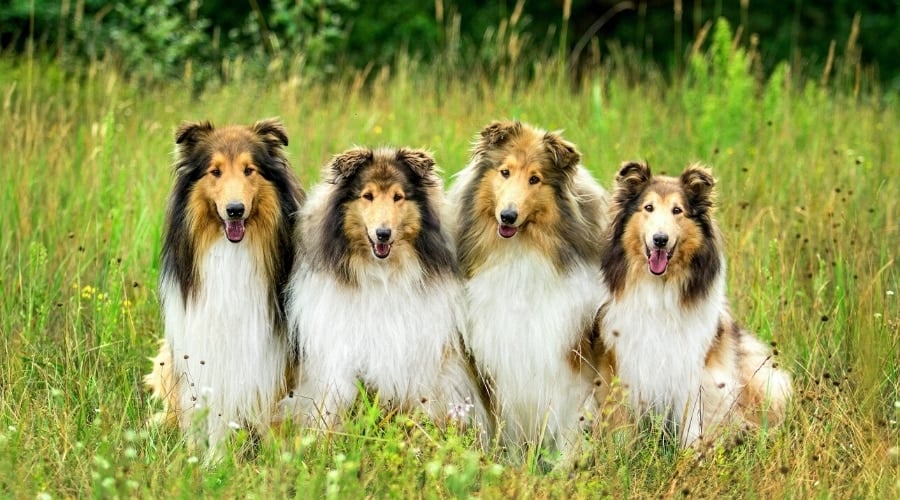
The Rough Collie originates from the Scottish Highlands, where he was used for herding cattle and sheep.
In the 1860s, Queen Victoria discovered the Rough Collie while visiting Balmoral Castle in Scotland. The royal seal of approval immediately caused demand for the breed to boom. By 1877, Collies were being shown at the Westminster Kennel Club show, where wealthy dog lovers, including J.P. Morgan, took them up.
In 1886, the American Kennel Club came into being, and the Collie Club of America became the second parent association to join the AKC.
From 1954 to 1973, the Rough Collie saw a massive worldwide increase in popularity, thanks to the T.V. show Lassie, which aired at that time.
Modern Rough Collies are not generally used for traditional herding duties. However, they are popular as assistance dogs, aiding people with disabilities. These active dogs also enjoy a new career as family pets and sporting dogs, including agility and obedience.
Temperament
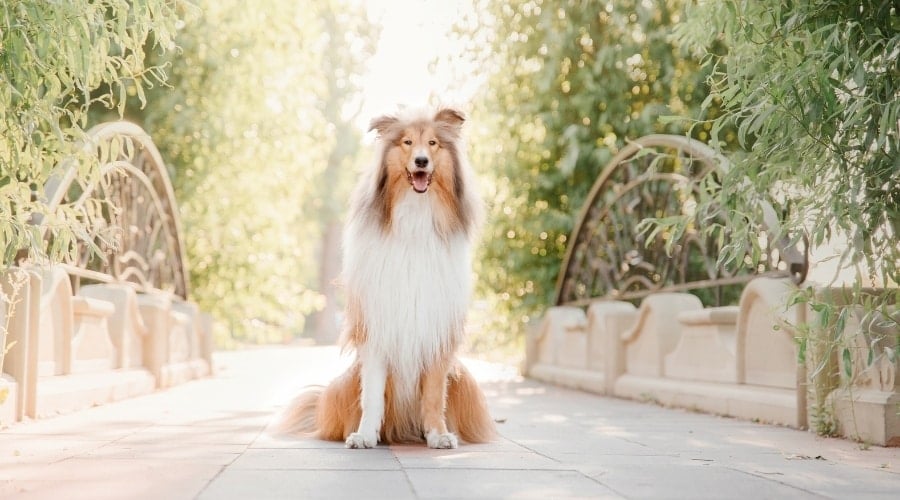
The Rough Collie temperament is one every dog owner hopes for. This breed adores children, and they typically bond very closely with all the members of their human family. They are excellent companions for children with disabilities, such as autism. As a breed, these dogs are very affectionate, thinking everyone is their friend. They will snuggle up with anyone willing.
On the downside, the Rough Collie is a herding breed, and they can nip at heels, which could frighten small children and won’t go down well with the family cat, either.
Also, as far as a Rough Collie is concerned, anything that moves is fair game for herding. That includes your kids, other dogs, chickens, etc. This can be remedied with proper training, though.
These fluffy pups are loving, intelligent, and loyal. They are rarely aggressive, nor are they shy around strangers. However, they are vocal and will alert you if someone enters their territory. For this reason, they make great watchdogs in the family home.
Size & Appearance
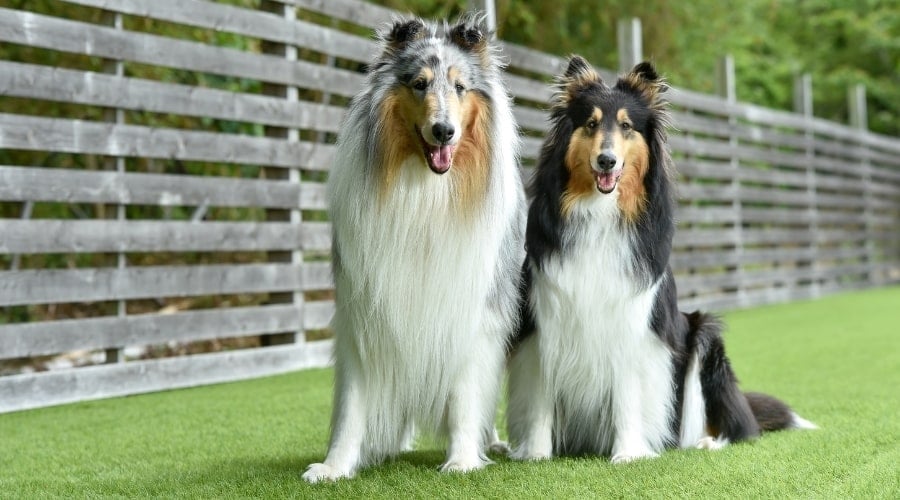
Collies are medium-sized dogs, standing from 22 to 26 inches at the shoulder and weighing in at around 50 to 70 pounds. Their thin frames are covered in thick, long coats, which make them look heavier than they actually are.
An angular head, elongated muzzle, almond-shaped eyes, and long, lush coat make the Rough Collie highly recognizable. They have a wispy appearance that comes from these long and pointy features and their long fur that flows behind them when they run.
Their long muzzles lack a stop, so they have a flat, wedge, or “dished” face. Their ears stand erect, but the tips fold over adorably from the top.
Coat & Colors
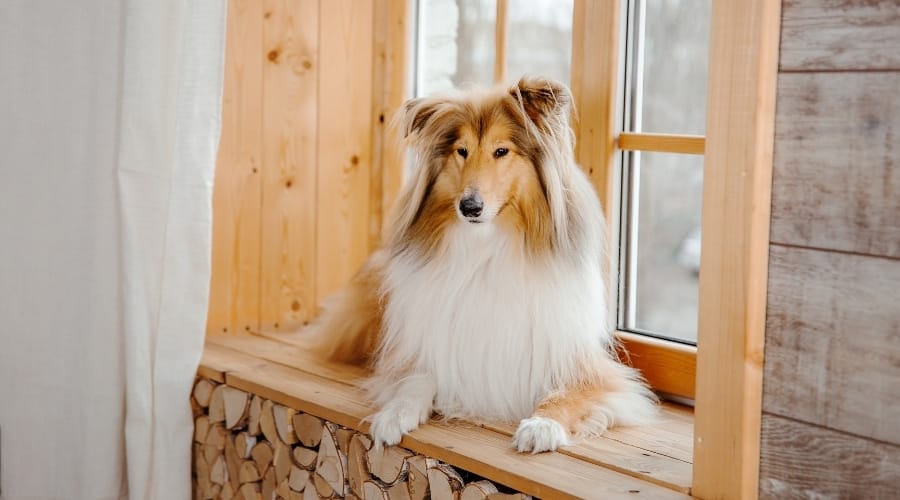
Rough Collies come in several color combinations: White, Sable & White, Tri-Color, and Blue Merle. A white Collie has a sable and white head but an entirely white body.
Rough Collies are double-coated. These pups shed year-round and “blow” their coats twice yearly in the spring and fall. That means massive shedding all over your place. Because of the amount of shedding your Rough Collie does, this breed is unsuitable for a home with allergy sufferers.
Exercise & Living Conditions
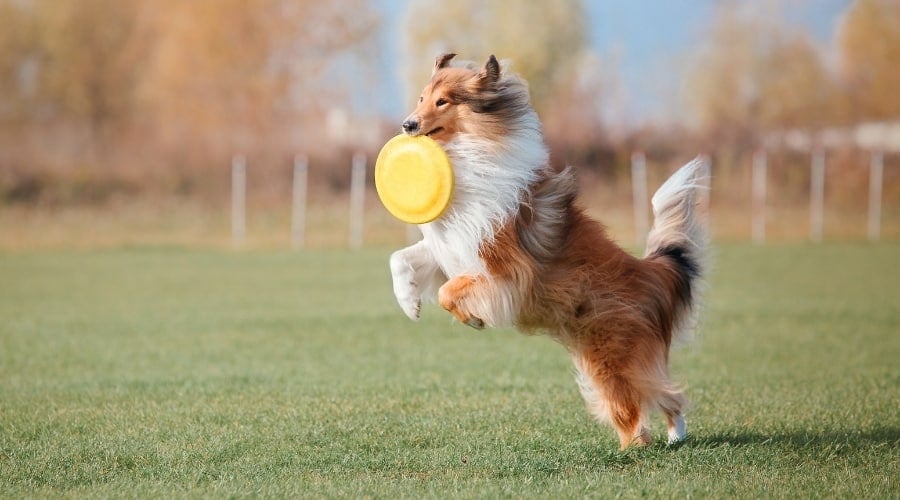
Generally, a Rough Collie should have two half-hour walks daily, including plenty of running and aerobic exercise. It would be best if you tried to include playtime, including games of fetch that will give your Rough Collie a chance to enjoy his innate instinct to herd.
Note that a bored Collie who doesn’t get enough exercise can be prone to barking and indulging in destructive behavior.
Although a Rough Collie has a double coat and would be warm enough living outside, these dogs are so clingy that an isolated Collie can certainly suffer from separation anxiety. That can lead to incessant barking and destructive behavior despite the gentleness of the Rough Collie’s temperament. Consider crate training if you must leave your Collie home alone and have experienced destructive behavior. A Rough Collie should live indoors with you and your family. These are not “outside only” pups. Outside time is necessary, but not for long periods or overnight.
Training
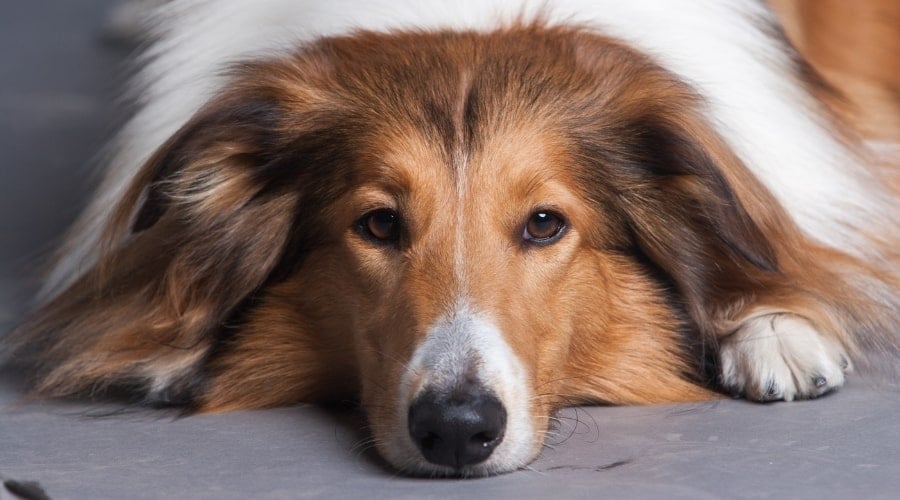
Rough Collies are very clever and quick to learn. As soon as your puppy is old enough and has completed his course of vaccinations, take your pup to special puppy classes for general socialization and basic training. Through the Rough Collie temperament is agreeable and eager to please, every dog must have basic training to learn proper behavior around other people and animals.
Keep your training methods consistent and reward-based. Collies love the attention they receive when performing simple tricks or competing in agility or herding competitions.
Health
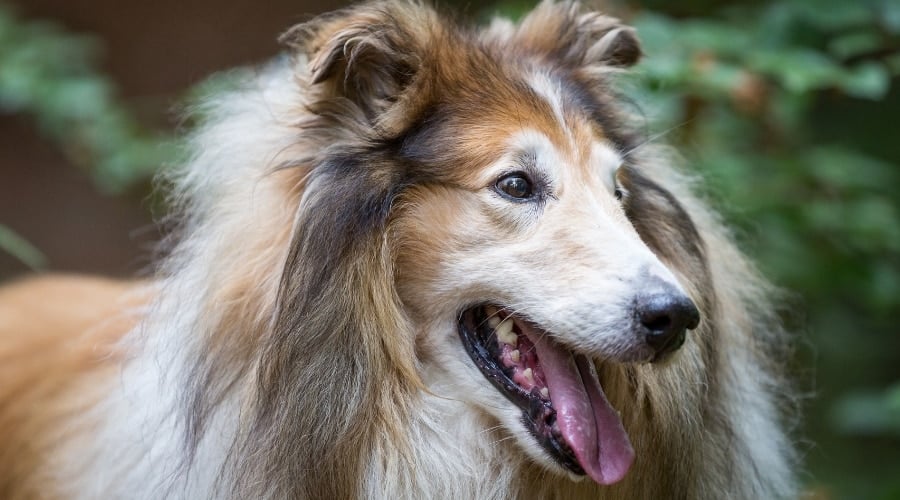
The average Rough Collie’s lifespan is between 10 and 14 years. Unfortunately, the breed is prone to a large list of health problems, including drug sensitivities, progressive retinal atrophy, collie eye anomaly, epilepsy, and bloat.
Drug Sensitivities
Rough Collies often have multiple drug sensitivity issues. Some of these issues are the result of a mutation in the multi-drug resistance gene, MDR1. That means dogs with this mutation can suffer potentially fatal reactions to several common drugs, including ivermectin and loperamide.
Always have your puppy checked by your vet for these conditions. A simple cheek swab is all required to give you peace of mind.
Progressive Retinal Atrophy (PRA)
PRA is a condition that causes the progressive wasting of the photoreceptor cells in the dog’s eyes. The disease causes the dog’s eyesight to deteriorate over time, ultimately resulting in blindness gradually.
Collie Eye Anomaly
Collie eye anomaly is the term for a range of eye conditions that range from minor to severe. These conditions are usually present at birth and can present in puppies as young as five to eight weeks of age. When buying a Rough Collie puppy, always check to ensure the breeder has had the pup screened for eye problems and can provide you with a certificate to prove it.
Bloat
Bloat, or gastric torsion, is a condition where the stomach fills with air, potentially twisting in on itself and cutting off the blood flow. Owners must be aware that canine bloat can strike suddenly and is invariably fatal if not detected and treated immediately. Some signs of bloat include drooling, pacing, pale gums, lip licking, dry heaving, and general signs of pain and discomfort. Unfortunately, once a dog has suffered an episode of bloat, he will likely suffer another.
Owners may want to consider a pet insurance policy for this breed. Look into this when your pup is young, as pre-existing conditions are not covered. It is better to set a policy up before any major health issues happen, especially knowing that Collies are prone to so many health issues. Pet insurance can help cover costs in an emergency, but a policy must already be in place, and some companies offer Wellness plans that assist with regular care.
Nutrition
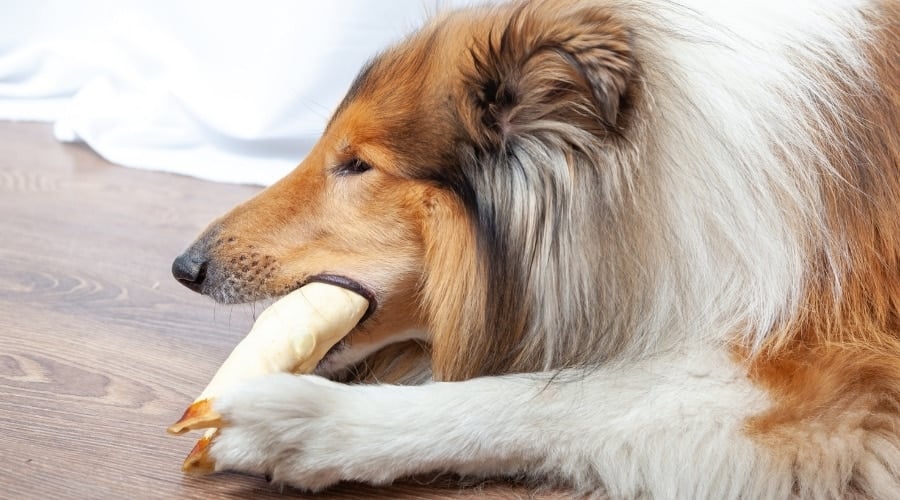
Rough Collies do best on high-quality dog food that’s meat-based, preferably with no grain content. Many respected collie breeders and experts on the breed feel that collies should not be fed a diet that contains soy or corn.
Because of the Rough Collie’s risk of bloat, two or more small meals per day are preferable, rather than one large meal. It’s also been shown that adding a small amount of meat to the food can reduce the risk of bloat. You may want to consider fresh dog food options like The Farmer’s Dog, which offers human-grade meals delivered to your door. Other notable options include Spot & Tango, which makes fresh and freeze-dried dog food.
Grooming
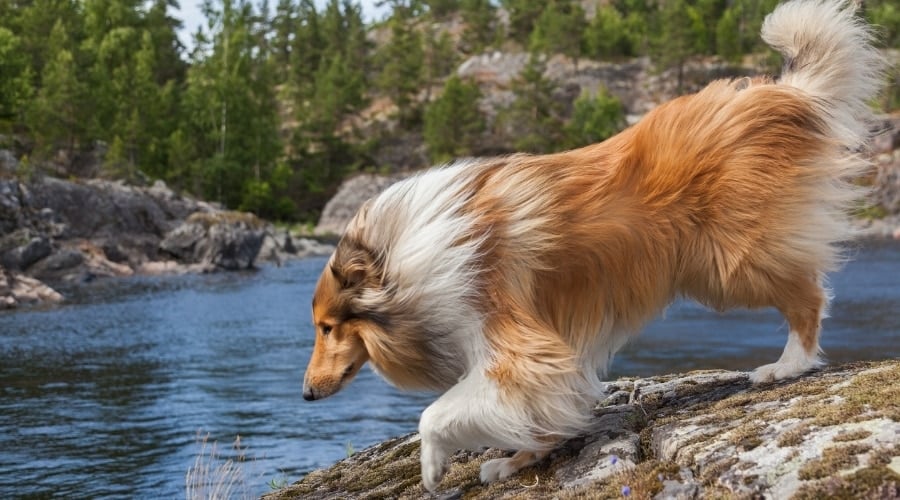
A Rough Collie needs grooming two to three times a week to keep the coat in good condition and prevent it from matting. The undercoat needs brushing out more often during the dog’s twice-yearly coat-blowing periods.
Note that spayed female Rough Collies have one big shed annually. If not spayed, females shed around three months after their heat cycle and will require more grooming at this time. Male Rough Collies shed most around their birthday and need more brushing then.
It is also essential to brush your dog’s teeth. They are prone to periodontal disease, so brushing them several times weekly to ward off tartar and plaque-causing bacteria is ideal for keeping them healthy. Periodontal disease affects most dogs by the age of three years, so keeping their teeth clean must be a priority.
Trimming or grinding your Rough Collie’s nails at least once or twice a month would be best to prevent injury. Long nails in dogs can cause arthritis and other health conditions in our canine companions.
Breeders & Puppy Costs
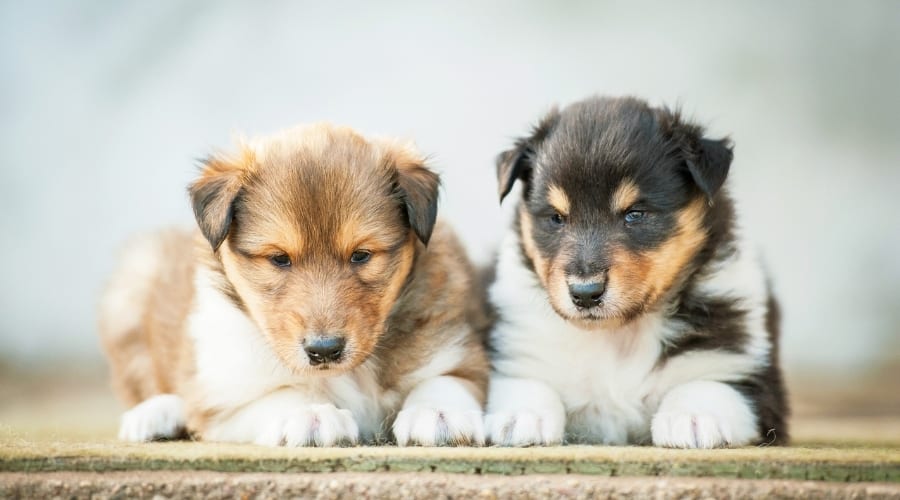
An excellent place to begin your search for a Rough Collie puppy is the Collie Club of America website.
Look for Collie breeders who subscribe to the Club’s code of ethics, which forbids the sale of puppies through pet stores. You could also check out the directory of breeders on the collie breed page of the AKC website.
The current price of a well-bred rough Collie puppy is around $1,200 to about $1,500.
Be very wary if you’re offered a puppy for a cheap price. It’s highly likely that the puppy has come from a so-called puppy mill.
Puppy mills are commercial enterprises that exist solely to produce vast amounts of puppies quickly and cheaply. To keep costs down, the breeding animals and puppies are not screened for the eye conditions Rough Collies are prone to. Also, puppies are typically not vaccinated or wormed, and many succumb to entirely preventable diseases soon after arriving at their new homes.
You should note that many backstreet pet stores get their puppies cheaply from puppy mills. Try to avoid these. Stick to local shelters and reputable breeders if you can. Backyard or home breeders may be an option, but make sure to ask lots of questions and ask for health screenings and treatment records.
Rescues & Shelters
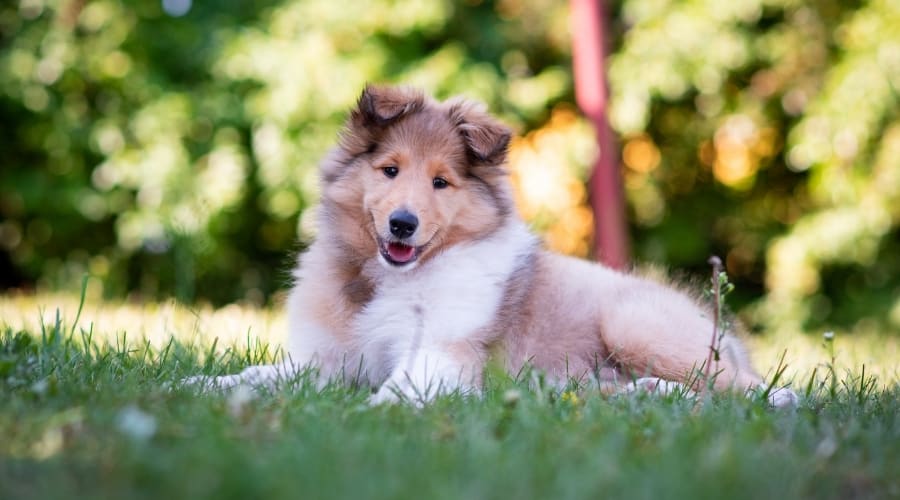
If you like the idea of offering a forever home to an unwanted Rough Collie from a shelter or rescue center, you might want to check out the Collie Club of America’s rescue network.
If you’re unsure whether a Rough Collie would settle well in your home, some shelters will allow you to take a dog home with you on a trial basis. This ensures that if the arrangement doesn’t work out, you can return the dog to the shelter, which will then find a more suitable home for him.
As Family Pets
Is a Rough Collie the perfect canine companion for your family?
Let’s recheck the main characteristics of the breed:
- Rough Collies are medium-sized dogs that need somewhere with lots of space.
- Because of their propensity for excessive barking, an apartment or place where you have very close neighbors would not be the best arrangement.
- Rough Collies shed continually and have two significant coat-blowing periods every year. If you have allergy sufferers in your home, this is not the breed for you.
- Because they are double-coated and molt continually, you’ll need to have plenty of time for brushing your rough Collie, ideally two or three times each week.
- The Rough Collie’s temperament is highly affectionate. They are dogs who love to be around children and their human family members.
- A Rough Collie’s lifespan is between 10 and 14 years.
- When socialized from a young age, Rough Collies will interact well with other family pets.
- As the Rough Collie is a herding dog, these pups will enjoy herding anything in the family that moves, including you, your kids, and the family cat.
- If a medium-sized dog is too big for you, especially with this much fur, you can look at a border collie or border collie mix like the Borador. Another great breed to compare the border collie with is the Australian shepherd, which is a herding dog and is smaller than a Rough Collie.
- You’ll need to be prepared to spend lots of time exercising your Rough Collie, as these dogs were bred to work all day and are not couch potatoes.
- You can’t keep a Rough Collie outside in a kennel. These dogs are much too family-oriented for that. A lonely Collie will occupy his time by barking incessantly and could become destructive also.
So, if you have an active household with kids, other pets, and no allergy sufferers, the Rough Collie could be a good match for you. You’ll need to be an enthusiastic groomer, too, to cope with all the shedding that your new canine companion will do.
Final Thoughts
If your perfect pet is an affectionate, family dog that loves kids, a Rough Collie may be the ideal match for you. You should note that the breed doesn’t take kindly to being left alone for long periods, and barking can be a problem for your neighbors if you live in a small community.
Rough Collies need lots of exercise, so you’ll need to enjoy walking. Also, Rough Collies shed profusely, meaning that you’ll need to devote a lot of time to grooming your dog.
So, if you want a loving, loyal, intelligent, trainable family pet, look no further than the magnificent Rough Collie.
